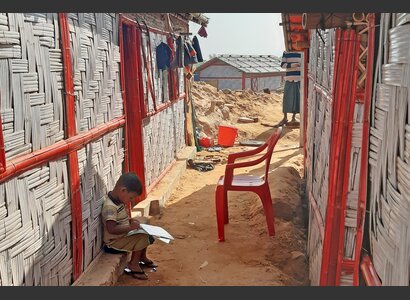For the past 7 years, more than a million Rohingyas have been crammed into the camps of Cox's Bazar without any change in their legal status. Their health and the security situation is deteriorating and new refugees are swelling their ranks, driven by renewed violence in Myanmar. Helvetas is providing aid in the camps and hopes that the political situation in Bangladesh following the recent fall of the regime will be an opportunity to improve their situation.
On August 25, 2017, more than 750,000 Rohingya victims of a brutal military operation in Myanmar's Rakhine state fled to neighboring Bangladesh, where they now live in the world's largest refugee camp.
While Bangladesh has opened its doors and allowed them to settle on its soil, it has also confined them to this rapidly overpopulated space without offering them legal status, the possibility of working outside or access to education.
Helvetas, the Swiss development cooperation and humanitarian aid organization, calls for increased international attention to this crisis and constructive collaboration with the new government of Bangladesh to find a lasting solution for the Rohingyas.
In addition, Helvetas calls on the Bangladeshi government to allow humanitarian actors to broaden the scope of their work in the camps (i.e., by authorizing activities that are currently prohibited, such as higher education, the pursuit of economic activities or the construction of permanent housing).
Since their arrival in Bangladesh, Helvetas has been providing assistance and training to approximately 1 million Rohingya refugees in the 33 camps in Cox's Bazar.
Not recognized as refugees
The Rohingyas live trapped in a five square-mile area and have not been recognized as refugees in Bangladesh. The country's recent political crisis, which resulted in hundreds of deaths among demonstrators and the flight of the government, has put Bangladesh in the international spotlight. But the increasingly precarious situation of the Rohingyas has not been brought to the fore.
Since October 2023 conflict has been reignited in Myanmar's Rakhine state, once again driving large numbers of Rohingya civilians to flee the region and swell the ranks of refugees in Bangladesh.
This new demographic pressure is being keenly felt in the Cox's Bazar camps.
The malnutrition rate there is 15.7%, which is the highest since the arrival of the Rohingyas seven years ago, with a stunting rate of 41.2% among children under five in 2023. Infectious diseases such as hepatitis C are widespread in the camps. In addition, the lack of access to health services for women and girls results in a high maternal mortality rate.
Highly precarious security situation
The security situation in the camps has also greatly deteriorated. Organized armed groups and gangs exploit the instability in the camps, forcibly recruiting young people. Theft, violence, kidnappings and shootings are now commonplace in a situation where the Rohingyas cannot leave the camps without permits that are difficult to obtain and do not engage in any paid work except what is offered by the humanitarian community.
Supporting the Rohingya and local communities
Helvetas works with Rohingya refugees and Bangladeshi host communities to strengthen their resilience in the face of natural disasters, improve their economic opportunities and foster social cohesion. Communities in villages and camps take part in short-term cash-for-work activities such as cleaning drainage ditches, repairing rain-damaged roads, paths and stairs, or planting bamboo to control soil erosion. Residents and local authorities decide which interventions are most urgent and determine which of the community's most disadvantaged people will be employed to complete the work.
Communities are also involved in mapping the risks of cyclones, flash floods and other environmental hazards in order to draw up a disaster response plan.
In host communities, we work in schools to promote a culture of safety. The school's disaster management committee, students and teachers develop plans to better respond to natural disasters and emergencies. They also work together to make the school a safer place for all, for example by organizing activities to raise awareness of child marriage.
In Rohingya camps there is very little green space and families have few opportunities to cultivate a garden, but with the right agroecological techniques it is possible to grow nutritious food – even in very small spaces. With the help of local service providers in host communities, we support Rohingya women to start their own vegetable production, sometimes simply in a few bags or on a strip of land outside their shelter. Local service providers organize training courses on how to prepare a seedbed or a sack and how to control pests using organic methods, and regularly visit the growers to offer personalized advice.


